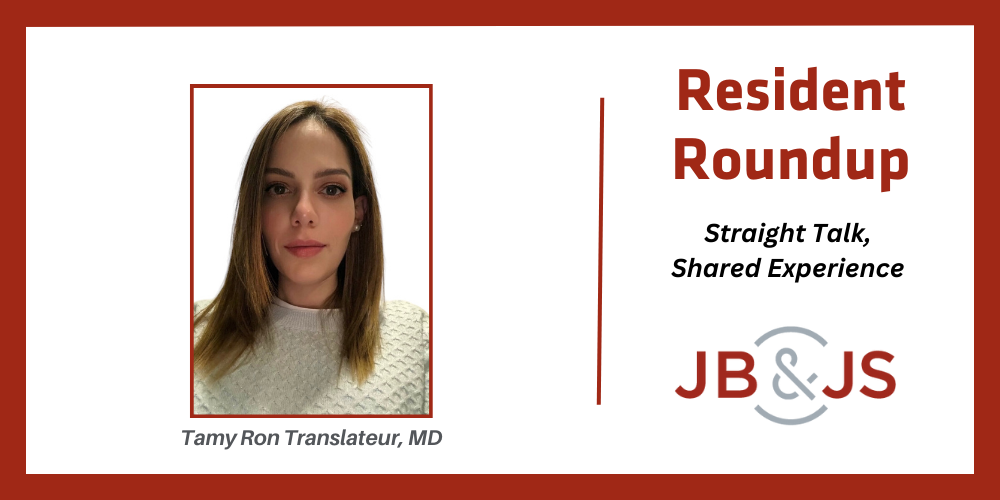This Resident Roundup post comes from orthopaedic surgeon Tamy Ron Translateur, MD.
Residency is a learning experience that shapes us on the path of our choice in medicine. To those in residency, remember that “no sailor became an expert in calm waters.” That the journey to being a specialist may involve long nights, accumulated fatigue, and missing out on social and family events. Every sacrifice brings an enormous reward that will be reflected in the results of a patient’s treatment and through the smile on their face. It’s more important than the economic part that this represents for the doctor; it is reflected in feeding the soul. This is why any opportunity to listen to a professor even during a coffee break, to attend a conference, to stay for an extra surgery or a few additional hours of outpatient consultation or in the emergency department can be useful, like an ace up your sleeve in the future diagnosis and treatment of your patients. Try not to lose patience, and most importantly, never give up!
I recently completed my residency experience. I was in shock at the farewell meeting that I was given because I couldn’t fully believe it: the day I had dreamed of, and had worked toward, had finally arrived. I’ve learned that persistence combined with resilience breaks the limits of all barriers of difficulty.
It was an adjustment, not having to set the alarm and put on scrubs in the middle of the night, or write up the case of a hospitalized patient for an instructor. My day can now begin with an early gym routine, and I might enter the hospital when the sun has already risen, not with the darkness and loneliness of the city as I have experienced. Again, persistence helped get me through.
More than that, I have arrived at a point when, as physicians, we start to take the next steps in our careers. Finally, we arrive at the hospital or clinic as the orthopaedist, and the dream begins to become real. In the first days and months, patients may not believe we are orthopaedists, but once we demonstrate our knowledge and impeccable care, the results will convince them.
Ours is one of the most multifaceted and indispensable specialties in medicine that not only includes the musculoskeletal system but also the entire progression of the patient’s rehabilitation. Our work can take place in different scenarios. If the day involves surgery, our first procedures may include a mix of anxiety, knowledge, and wanting the best result for the patient. My routine is to make a surgical plan the day before, including the materials required, knowing, too, that the plan could change during the procedure and a new plan could be needed. If there is any doubt prior to a procedure, you should never hesitate to ask a professor or a colleague; depending on the complexity of the case, they may even be willing to assist during the surgery. It should be remembered that it is a progressive process, so asking for help when needed is not a sin.
If you are in an outpatient consultation, time is limited and many things must be done to care for the patient, but attempt to complete what’s needed on time, out of respect for the patient. However, also take the time to look at the patient’s face from the moment they enter the office, and do not ignore the physical examination. Ask about the patient’s work and daily activities when considering a potential diagnosis. Any comments can help guide your knowledge of your patient.
If you find yourself in the emergency room, adrenaline may be part of your day. At the same time, remember to be the friendly face in front of patients and their families. We are privileged to be part of the treatment team for the child who fell in the park, the elderly person who tripped in the bathroom, or the patient who has been in a traffic accident or injured in war. The initial stabilization and clear explanation of options and prognosis are keys to successful treatment.
It is always a plus to find a group at work, such as in an academic environment, who are guided by the collection and study of data to carry out evidence-based research and publications. Read the recent article that caught your attention, and keep reading. Attend courses or symposia; it is worth it because there is always some information to help you stay updated and that benefits patients. I am also grateful for the opportunity to be a reviewer, to provide constructive feedback and offer specific suggestions to authors. It’s a highly rewarding experience, while adding to my knowledge to improve patient care.
If what you dream of is to be an orthopaedist, always think about being the best for your patients. If your plans are to become a Fellow, study and focus on your objectives to achieve the goal. What we must never forget is that adequate knowledge together with vocation, empathy, and humility will be the recipe for success. The current trend of using robots and artificial intelligence in the field of orthopedics is a great tool, which must always be guided by the solid knowledge of the surgeon.
To all those who were on my path and who have taught me, guided me, and helped me in many ways, I dedicate these famous words by Voltaire: “Appreciation is a wonderful thing. It makes what is excellent in others belong to us as well.”
Tamy Ron Translateur, MD has previously contributed to OrthoBuzz: Persistence in Ortho
Residents and Trainees: Join the Orthopaedic Conversation on OrthoBuzz
Interested in being published on the JBJS OrthoBuzz blog? Residents and trainees are invited to submit a post to Resident Roundup. Share your experience as a resident, connect with others in orthopaedic training, and add your viewpoint to the orthopaedic conversation. Find out more here. Questions and submissions can be sent to orthobuzz@jbjs.org .



